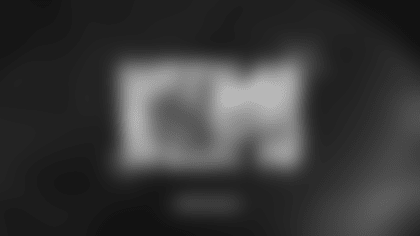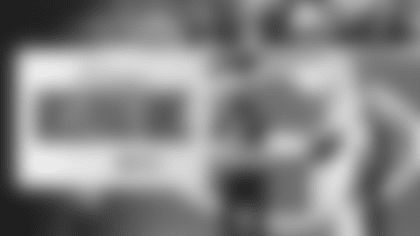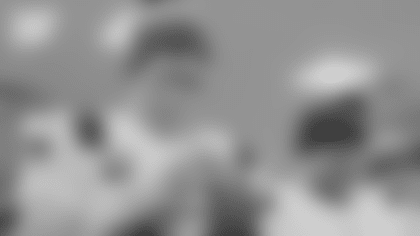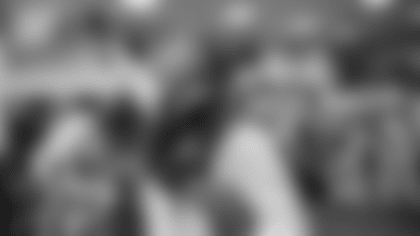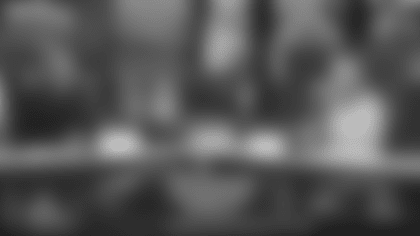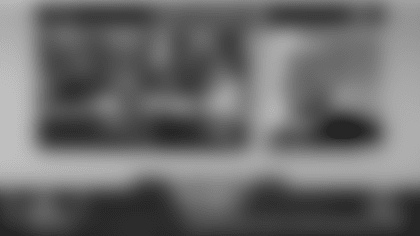HEAD COACH BILL BELICHICK
Conference Call
Tuesday, September 24, 2019
Q: What are the conversations on staff like when discussing how to replace a player like James Develin considering what he brought to the table versus not trying to replicate exactly what he brought to the offense and just focusing on utilizing something else?
BB: Right, yeah, that's a good question. First of all, I think we're fortunate to have one James Develin on our team. He works extremely hard, he's a versatile player that does things for us offensively and in the kicking game, very dependable and has a lot of experience in our system. We're lucky to have him. To have two of him and to be able to replace him with another James Develin – it's just unrealistic – and that's true at a number of positions for us. There's no one person that can do what he does. That would have to be modified in some way. You might replace him with one person on one particular thing but offensively and the kicking game and some of the other roles that he has in those areas as well, not just our first down offense and goal line but, again, when you add all of those together, he has a number of different roles on our team including the kicking game. It'll be hard for any one person to do that. I think you can kind of eliminate that and look at, "OK, here we have first down, we have second down, we have short-yardage and goal line, we have punt team, we have kickoff return, we have all of the things that he participated in. What's the best way for us to manage those situations now?" Is it one person? I doubt it. So is it a combination of people on or off the roster? That's really the conversation and then you go from there.
Q: How unusual or unique is the H-back position in today's NFL?
BB: When you say the H-back, what exactly do you mean?
Q: I guess more of that hybrid type of role between a tight end and a fullback where they offer that positonal versatility to accomplish several different roles for an offense.
BB: Yeah, I don't think there are a lot of fullback-tight end combo guys. There are some tight ends that line up in the backfield. I would say that H-back or that combo guy to me is the player that's part receiver and part tight end. Those are the kind of guys that do you treat them as a receiver or do you treat them as a tight end? Guys like [Mike] Gesicki, players like that. They're really not tight ends, they're really not receivers. They're good players. How do you want to classify them? You could have that conversation about Dawson Knox, for example, as well. Again, I'm not saying those guys are the same. I'm just saying those are the types of players that really create the conversation because they can split out, detach from the formation, be in tight end locations but they're very good receiving tight ends at that position relative to what your normally see there. Those are, I'd say, the hard game plan questions to answer with those type of hybrid players.
Q: How has your depth allowed your defense to remain consistent despite different guys being active or inactive for any particular game thus far this season?
BB: Well, Matt [Dolloff], I think it starts with practice. We practice really a lot of players so we're in there in different combinations in practice and fortunately, or unfortunately, if we end up with a situation where somebody's unavailable for the game, then in a lot of cases those rotations have already occurred on the practice field. Like in Kyle [Van Noy's] case, of course he would've been active for the game and he would've had a major role in the game, but John [Simon], and Jamie [Collins Sr.], and Shilique Calhoun, and [Chase] Winovich – those guys – they were all working there anyway, so the adjustment for those guys is really not that big. It's a little more playtime. Where it impacts the team the most on a situation like that is not just defensively in the defensive packages, it certainly takes away some depth, but also affects you in the kicking game as far as players who are on four phases or maybe it could be less than that – two phases – then you don't only have to replace them on defense but you have to replace them in the kicking game. I think it's a little bit challenging defensively when you have several different packages, an early down package and a couple of different third down packages, sometimes the same player doesn't always replace him in all of those situations. Depending on who the player is and what the game plan is, that could get a little more challenging. But, overall, our depth is good. Those guys get a lot of work in practice and they're somewhat interchangeable.
Q: During an interview you did with Willie McGinest earlier in training camp on the NFL Network you mentioned you may be a little more involved defensively this year. How has that involvement gone this year as you've balanced the myriad responsibilities that come with being a head coach?
BB: Well, we have a lot of good coaches on our staff, a lot of experienced coaches on our staff as well. I have a lot of confidence in them. They do a great job, they work hard, they're very well prepared. I'd say the interactions are something that we've grown through in the offseason and training camp, but it's gone well.
Q: How have you seen Jerod Mayo grow as a coach over the course of the spring and summer but now through three weeks in the regular season here? What is the meeting room dynamic like for those players that have inside linebacker and outside linebacker roles and responsibilities – do they go to one meeting and then another or are those roles kind of grouped together in that sense?
BB: Right. Phil [Perry], that's a good question. We've talked about that and what we try to do is maximize the time that we have with the players, so we have to answer that question on a daily and on a weekly basis depending on what their roles are and how things are set up for that particular week. They all have a good understanding of what their teammates do and what the adjacent positions do so whether they play that position or not they understand what that person is doing. That helps them I think understand and handle their responsibility. When you have versatile players like that, there is an element of organizationally putting them in the right spots so that they're not sitting there listening to a bunch of stuff that doesn't apply to them and missing things that are important wherever you put them. Sometimes we have to double up. Sometimes they meet and then we have to have another meeting with them to go over like, "OK, well, here are some thing that we talked about that you missed that'll be important on a couple of these calls." Whatever it happens to be. At times we have to do that. I think that DeMarcus [Covington] and Jerod and Bret [Bielema] do a good job of kind of keeping track of that. We've got to make sure that we get this player this information or that information because he wasn't here when we went over this because he was going over something else that was important. That's something that we have to keep track of. It's a good question and it's something that organizationally is a little bit of a challenge. Going back to Jerod – Jerod's done a great job. His experience as a player in our system is very valuable. We can talk about calls that we can make on the field or identifications and so forth and his perspective of, "Yeah, that's no problem. That'd be easy. That's easy for us to do," or "That's a lot harder because the player is thinking about 'this', he's thinking about 'that' and so forth." It makes us re-think and have that perspective of how easy it is or isn't for a player in certain situations. He's done it and he's done it under pressure and dealt with a lot of things we currently deal with and so that's a good perspective to have in the room. We don't have that from anybody else defensively. But as far as adapting to the coaching lifestyle and so forth, Jerod's done a great job.
Q: Do you ever notice that innate coaching ability from active players or do they usually surprise you when they want to come back to it or gain an interest in coaching?
BB: Yeah, Tara [Sullivan], I think every situation is different just like each of us are different. We have different personalities and strengths and weaknesses and interests and so forth. I think you just have to take each situation individually and evaluate it accordingly. Certain things might be right in one situation and not be right in another. Coaching could be right in one situation and it could be not right in another situation and vice versa. To me, it really would depend on the individual, the circumstances, the situation, what their goals are, what your opportunities are, so forth and so on. I think it's very individual. I couldn't generalize it.
Q: When a player misses a game to be with their family during the birth of a child, is that a policy of yours or do you handle those on a case-by-case basis? How does that decision come about?
BB: Yeah, we handle it internally. I've coached for quite a while as a head coach in two different organizations. I don't think that's ever been an issue. I've always talked about it with the player. It's not like it's a surprise. It's something that there's certainly a lead-up period to and communicate about it and depending on the time, the situation, the circumstances and all that, you take everything into consideration. Everybody wants to do what's best and we arrive at that conclusion. Again, there are a lot of variables on that – what the individual's situation is with the birth, where the game is, so forth and so on. There's a lot of things that could come into play. I think it's just good communication and try to find out as much information as you can. You never have all of it. Sometimes you have to call an audible, but you figure it out and then just everybody has the best interest of everything that's involved and try to make a good decision on that.
Q: You've always said there's a lot of growth in players from Year 1 to Year 2. I'm curious if you've seen that growth already from Josh Allen at the quarterback position in Buffalo.
BB: Definitely. Definitely. He's a very good player. He has a lot of physical talent, but you can see he's catching up with the game in terms of his control at the line of scrimmage, recognizing defenses, reading coverages, making decisions. I think all of that is certainly improved over the last year, as it does with most all players, especially ones at that position. But he's a very talented player and he, again, continues to get better. Again, having a second year in the same system with the same offensive coordinator with a lot of carryover, I'm sure that's helped him as well. He's definitely improved and developed and he'll be a very challenging player for us to defend this week.
OFFENSIVE COORDINATOR JOSH MCDANIELS
Conference Call
Tuesday, September 24, 2019
Q: Your personnel groupings this past week seemed more limited than usual. How does that manifest when game planning during the week?
JM: Well, each game is a little different in terms of the overall depth, based on injury and availability. Some weeks we have a plethora of personnel groupings that we can use and try to put our players in different positions, and we're going to get different looks from the defense based on that. And then there's other weeks like this past week where it was a little more limited – a lot more multiple receiver groups, just based on the availability that we had. So, it limits what you're able to present the defense, but we practice based on the availability that we expect to have on Sunday and always like to have balance with our groupings and try to use as many personnel groupings to force the defense to defend those as we can. Some weeks it turns out in our favor and we can do that, and other weeks we're more limited and we've got to go with what we have. So, Sunday was kind of an example of that.
Q: What are your thoughts on James Develin going on injured reserve? When he goes out of the lineup, does that mean there are personnel groupings you won't be able to use?
JM: Yeah, James is a special guy and he's certainly played a valuable role in our offense. He's had a lot to do with our success when he's on the field and has certainly been recognized for that, deservedly so. He provides a toughness and a leadership and a physicality that we love around here. He's a great person, great worker, great attitude, always a positive contributor to our performance offensively. So, yeah, you're not going to just plug in somebody and replace that. Like I said, we have depth on the team or the practice squad to be able to try to facilitate some different things as we go through the season and incur injuries, and so we'll try to do the best we can to put the right guys out there in positions where we think that they can be successful. Sometimes you can put a guy in and get some similar results, and other times it might take a little while. We'll see in this case what we're able to do as we move forward.
Q: Five players who were big contributors to the success of the run game last year are not available to you now. How much of a challenge is it to get new guys to able to replicate the success of last year? Does it require some learning on the fly to adapt to different players and different strengths?
JM: Look, injuries are a part of our game, and that's why we have depth on the roster and on the practice squad. Every team goes through the same challenges. Every group we play has injuries on the other side of the ball, and they have to deal with that as well. That's just the nature of our sport. I think the goal for us is not to replicate what we did last year; it's to try to figure out how we can be the best version of ourselves this year with the personnel that we have playing and available for us each week this season. So, we're not going to try to force somebody to do something that somebody else did last year if they're not suited for it. We'll try to figure out how to use their strengths to their advantage and to our team's advantage, and try to go out there and be productive offensively with what we have now. I mean, none of us are worried about what we did last year or schemes we used. We're just trying to figure out the best positions to try to put our players in this season, and in particular this week against a really good defense that we're playing against on the road, against Buffalo.
Q: Looking back at the success you had on Ryan Izzo's catch off of play action this past week, how good do you think the offense is off of play action and how much better do you feel you have to get, especially with the loss of James Develin?
JM: I think that's always a work in progress. I always consider those plays team plays. If you're going to try to give the defense a look and try to simulate something that you want them to react to, then all 11 players in some way, shape or form are very involved in trying to present that look to the defense. So, in that particular play, I thought the line blocked well, I thought that Ryan engaged the defensive end, Sony [Michel] and Tom [Brady] had a good fake which brought some people closer to the line of scrimmage, Julian [Edelman] went in to try to crack the down safety. So, there's a lot of things that go into a successful play when you're using action passes like that, I would say not the least of which is how well you're running the ball. So, I think that if you run the ball well, then you force the defense to come up and maybe be a little more aggressive to try to stop the run. So, big focus for us is trying to make sure we tie two things together that complement one another. So, our run game and our actions off the run game, they kind of go hand-in-hand with one another. Again, we kind of consider those team plays. Everybody's got to do their job right, and if we can do one well, then we have a chance to do the other thing well off of that.
Q: What has allowed the Bills defense to have success this season?
JM: This is certainly one of the best defenses in the league and it has been for a while. They got a lot of players back, first of all. I think Coach [Leslie] Frazier and Coach [Sean] McDermott, they do an incredible job of coaching this unit. They're on the same page, very rarely out of position, they communicate well, they defend the deep part of the field and very rarely give up big plays, which forces you to have to drive the ball eight, 10, 12 plays without making an error or a negative play to score. They take the ball away as good as any team in the league and it was the same thing last year, whether that's opportunistic coverage players that have good hands and intercept the ball, or they do a good job of running and chasing the ball and stripping and punching at it when you're running with it. They've historically been very stingy in the red zone. They're very good on third down. It's a group that forces you to be patient, disciplined and execute. They don't make mistakes, they challenge you for every yard and they're not going to give it up in one play. And, it's on the road in a place that's as hard to play as we play in, with the noise and the atmosphere, and I'm sure it'll be incredible on Sunday. So, we're going to be dealing with that and having to do a good job of stringing a lot of positive plays together to move the ball down the field and put it in in red zone and score points on Sunday. So, talented guys at all three levels, very well coached, tremendous respect for the way they play and really, we've got our work cut out for us. We're looking forward to starting our preparation with the players tomorrow.
Q: With guys that practice during the week and then become unavailable for the game on Sunday, what kind of adjustments do you have to make between the time you leave the field on Friday and the time the 46-man roster becomes clearer for the game?
JM: That's a great challenge and it's actually a lot of fun to go through. As stressful as that might seem for us on a week-to-week basis, it's part of the week every week. There are times where there's some uncertainty about availability, and the only thing you can do as a staff and as a group offensively is you put in things that you feel comfortable with the players that can practice for you. You go out and you execute those the best you can, and you never really put an end point to the preparation. In my mindset, I just kind of take on the mindset of, "If we were to incur an injury in the first series of the game, how would we handle that?" And our players – we talk to our players. They understand that there's tremendous value in them being able to handle multiple roles and adjust quickly on the fly if we need to, which happened during the game on Sunday. It happened on Sunday morning when we found out that James [White] wasn't going to be available. It happens constantly. So, if you feel like, "Well, we're going to put an expiration date on the game plan," and then all of a sudden you find out two guys can't go and then you feel like you've got to make all of these different adjustments and all the rest of it, that's a different mindset. What we do is try to put together a plan that has some flexibility to it, so that if we do happen to lose somebody, we still can play offense. And if we have to switch groupings or if we have to put the next guy in at that position, then that's what we have to do. Sometimes we know that stuff on Tuesday or Wednesday; sometimes we don't know it until Sunday right before the game when we find out whether somebody can or can't go. So, you've just got to keep an open mind on the whole thing. We have enough guys at the game to be able to function. We may not be able to function exactly the way
INSIDE LINEBACKERS COACH JEROD MAYO
Conference Call
Tuesday, September 24, 2019
Q: How are you enjoying your new role on the coaching staff? What is your impression of what your defense has done so far?
JM: I'm enjoying the new job. Every day is a different day. I'm enjoying being back around the guys, and honestly, it's always fun winning games, especially when the guys go out there and play well. It makes for an enjoyable experience. So far, so good. Thanks for the question.
Q: How collaborative is the defensive play calling? Secondly, how much of an advantage has it been, having played for Bill Belichick, now being on his coaching staff?
JM: To answer your first question, game planning in general is collaborative. We have the benefit of having Coach Belichick in the room with us each and every day, which is a benefit to all the coaches, especially having a young coaching staff. Definitely a learning experience, a collaborative experience, and I think all the coaches put in, as far as game planning goes. To answer your second question, playing under Coach Belichick, we couldn't ask for anything more. Obviously, one of the greatest head coaches of all time, not only the things you learn as far as X's and O's, but also things off the field and just leadership in general. So, I definitely try to take those principles that I learned as a player and apply them as a coach. It's definitely been a good experience. Thanks for the question.
Q: Has Jamie Collins changed at all as a player since you played with him? Specifically, in the running game, he has been pretty impressive as an edge setter at times.
JM: I think we all know or have known for quite some time now that Jamie's a very versatile player. He has great size, great length, he's able to do a bunch of different things. As far as Jamie's play in the run game, it's been great up until this point. Definitely things to work on going forward, but he's made a lot of big plays for us thus far. He's definitely playing the run well. His first stint here, he was more in the bubble and now he's more on the edge on the early downs, but he's doing a good job wherever we ask him to play.
Q: On a lighthearted note, how surprised are you that the ratings of Quick Slants continue to rise, even with your departure in the last year?
JM: Mike [Reiss], that hurts my heart. No, I'm playing. Honestly, I had a great time there on Quick Slants with Tommy Curran and Phil [Perry], as well. Those guys, they didn't need me, and that's why I retired from TV. That's why I'm over here on the coaching side now. That's funny.
Q: On a serious note, how did that experience help you as you get into coaching? Obviously, you had a lot of dealings with the media as a player, but did it help you at all see the business from the other side in terms of this aspect of being a coach and the media responsibilities that come with it?
JM: Absolutely. When I was on TV, I didn't have to interview a lot of players, but I would go down to the Super Bowl sometimes and have to interview guys, and I know just how hard it is sometimes to get guys to answer questions. So, I try to answer these questions with full transparency, and hopefully I'm informative to you guys because I know how difficult it is for you guys to do your jobs on a day-in, day-out basis, especially the local media who see the same guys each and every day. Definitely a different level of respect for you guys.
Q: What does Josh Allen bring to the table for Buffalo and what sort of challenge does he present for your defense?
JM: Yeah, anytime you go against a guy like Josh Allen – first of all, let me talk about some of the positive qualities of Josh Allen. Big arm, can make all of the throws - I mean, honesty, you see him throw off his back foot 60 yards down the field, so you definitely have to take care of the deep part of the field. But then you look at his legs, right? You look at this guy making plays, running around. You have to account for him in the run game. It's not like a Michael Vick as far as that 4.3 speed, but he's one of those crafty guys – he's only in his second year, but very crafty as far as moving throughout the pocket – so it's definitely going to take all the guys to kind of contain him and make him play from the pocket.
Q: Jamie Collins seems to constantly be in the right place at the right time. What is it about his game that puts him in those situations? Is it a matter of having instincts or game planning?
JM: Yeah, you know, I think it's a combination. I think, first of all, Jamie is a very smart guy. He's able to recognize a lot of different things, a lot of different plays. He studies a lot of film, and he's played well for us up until this point. So, he's definitely a smart guy. I think that really helps him. As far as game planning is concerned, one week he's on the outside, the next week he's on the inside, so it goes back to his versatility, just being able to play different positions, and he's making big plays at all of them. So, definitely great to have a guy like Jamie.
Q: What does the group of linebackers that you have with their versatility, smarts and talent allow you to do as a coach? Does that allow you to be more creative and wide reaching in what you and your defense can do?
JM: Absolutely. These guys are totally different than I was as a player. I was your classic inside linebacker. When you look across the room, you look at all of our linebackers, they're able to do a lot of different things. Anytime you're able to have guys who can put their hand in the dirt, who can blitz from off the ball, who can cover from off the ball, it's always beneficial to the coaching staff. So, it's definitely a benefit to all of us.
Q: You know what a championship defense looks like from the inside out, having played for one. Do you think this defense has that same potential?
JM: Up until this point, the defense has played well, but you know this defense will look totally different in a few months from now. Hopefully, we can go out each and every day on the practice field. Coach says it all the time, "Practice equals game reality," and that's what we kind of live by. So, hopefully we can continue to get better each and every day. I don't want to look out too far, but I think if we go out to work each and every day, that we'll be in a good place when it's all said and done.
Q: There is an important event next week as Duron Harmon is having a charity karaoke night. Are you involved and what will your selection be?
JM: Look, if I was a player, I would definitely be involved. But as a coach, we're here until late nights. Late nights working for Coach Belichick; we put a lot of work in. So, if I can get out of here early, I'll be there. What song I'm going to sing? You'll just have to show up and listen.


